Health and Social Care: Philosophical Approaches and Legal Issues
VerifiedAdded on 2023/05/31
|8
|2071
|67
Essay
AI Summary
This essay provides a comprehensive overview of ethics in health and social care. It begins by defining ethics and its influence on decision-making within the field, emphasizing the impact of cultural values and professional codes of conduct. The essay explores philosophical approaches to ethics, including deontology and relativism, and details four vital ethical principles: autonomy, beneficence, justice, and non-maleficence. It then delves into the concepts of morality and moral judgment, highlighting their strengths and weaknesses, and examines the elements of moral judgment in health and social care. The essay further addresses practical ethical issues and dilemmas, such as abortion and euthanasia, and discusses relevant legal frameworks, including the Equality Act 2010, the Human Rights Act 1998, the Data Protection Act 1998, and the Mental Capacity Act. The conclusion underscores the significant influence of ethics on health and social care delivery, emphasizing the role of laws in protecting patient rights and promoting informed decision-making. This document is contributed by a student to be published on the website Desklib.
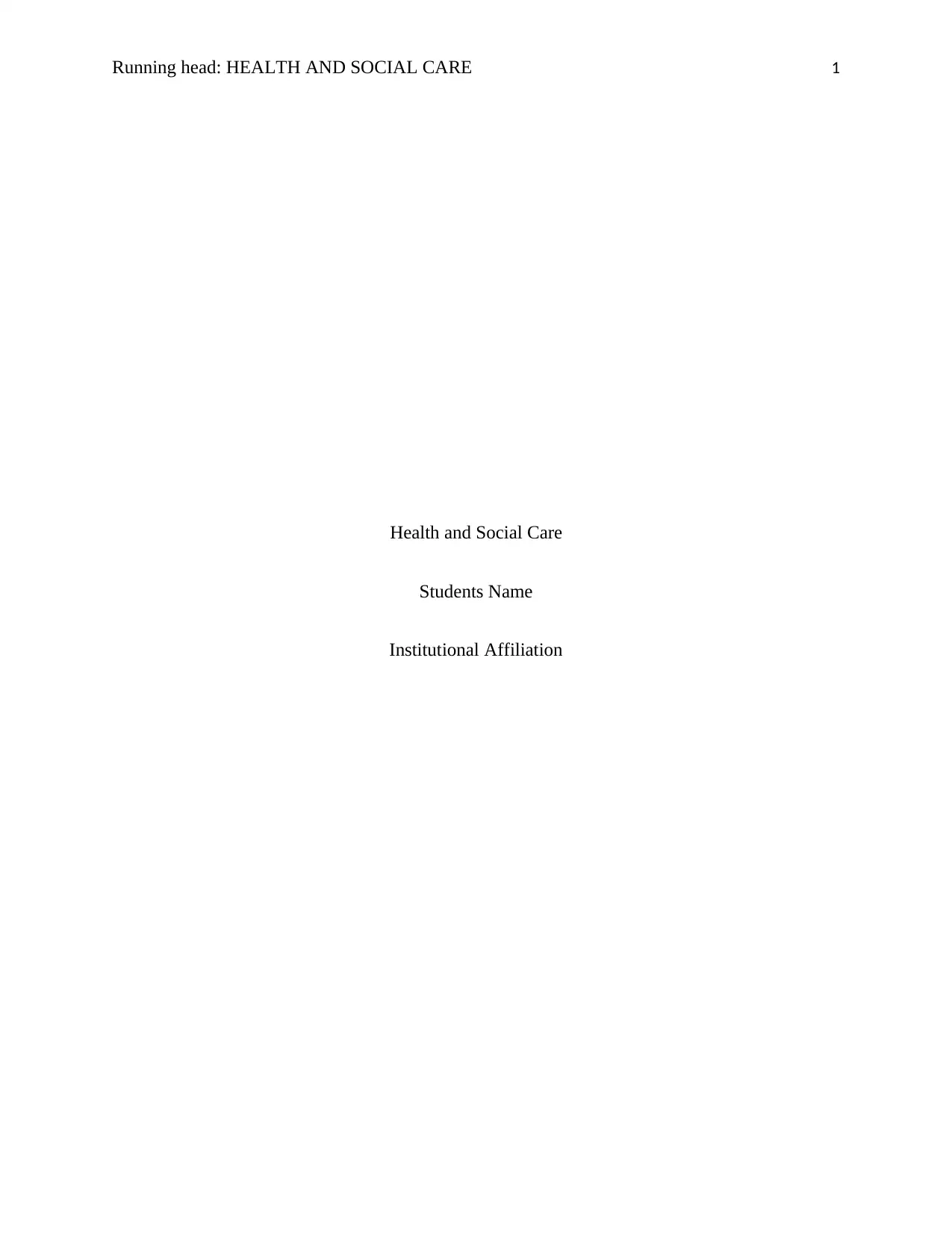
Running head: HEALTH AND SOCIAL CARE 1
Health and Social Care
Students Name
Institutional Affiliation
Health and Social Care
Students Name
Institutional Affiliation
Paraphrase This Document
Need a fresh take? Get an instant paraphrase of this document with our AI Paraphraser
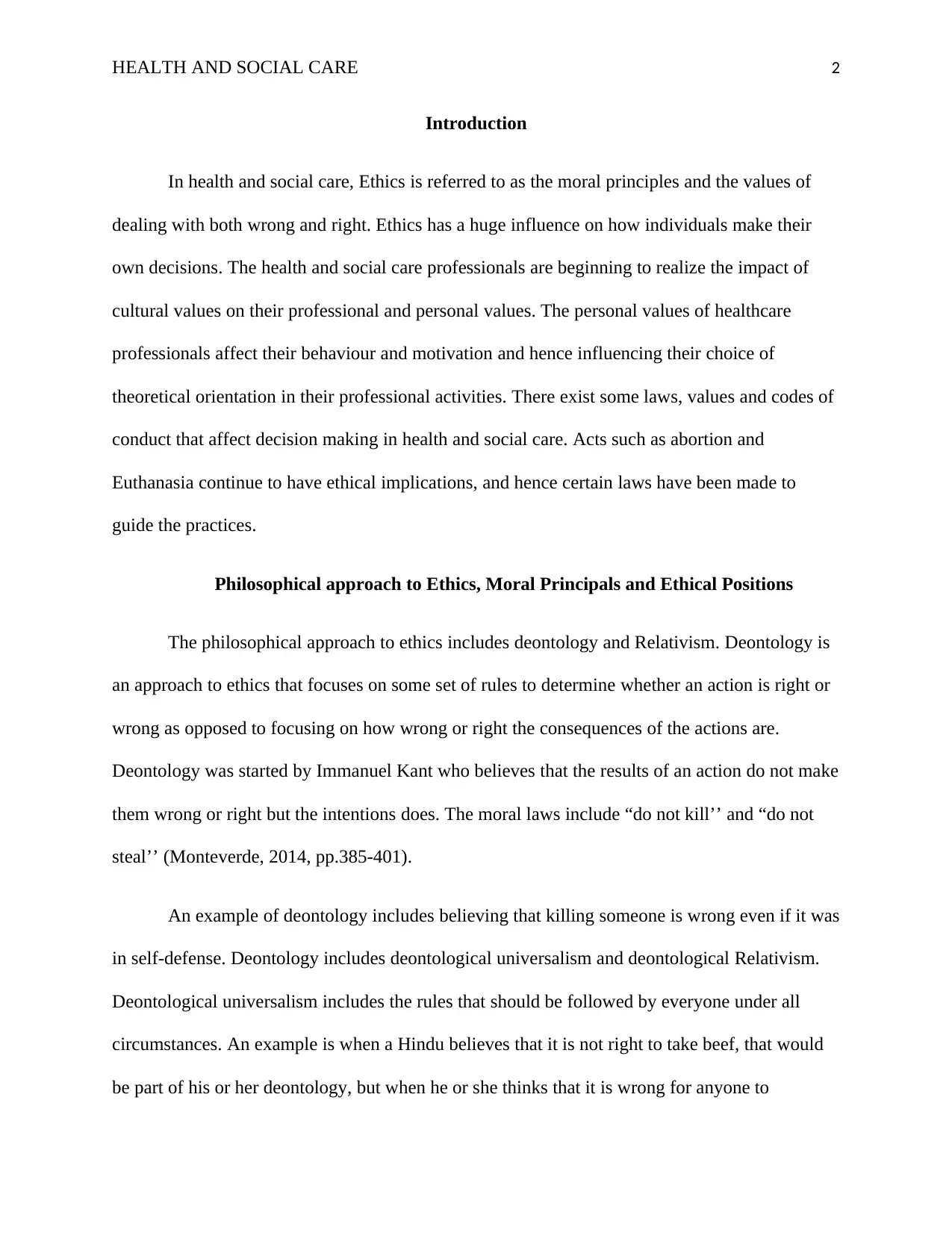
HEALTH AND SOCIAL CARE 2
Introduction
In health and social care, Ethics is referred to as the moral principles and the values of
dealing with both wrong and right. Ethics has a huge influence on how individuals make their
own decisions. The health and social care professionals are beginning to realize the impact of
cultural values on their professional and personal values. The personal values of healthcare
professionals affect their behaviour and motivation and hence influencing their choice of
theoretical orientation in their professional activities. There exist some laws, values and codes of
conduct that affect decision making in health and social care. Acts such as abortion and
Euthanasia continue to have ethical implications, and hence certain laws have been made to
guide the practices.
Philosophical approach to Ethics, Moral Principals and Ethical Positions
The philosophical approach to ethics includes deontology and Relativism. Deontology is
an approach to ethics that focuses on some set of rules to determine whether an action is right or
wrong as opposed to focusing on how wrong or right the consequences of the actions are.
Deontology was started by Immanuel Kant who believes that the results of an action do not make
them wrong or right but the intentions does. The moral laws include “do not kill’’ and “do not
steal’’ (Monteverde, 2014, pp.385-401).
An example of deontology includes believing that killing someone is wrong even if it was
in self-defense. Deontology includes deontological universalism and deontological Relativism.
Deontological universalism includes the rules that should be followed by everyone under all
circumstances. An example is when a Hindu believes that it is not right to take beef, that would
be part of his or her deontology, but when he or she thinks that it is wrong for anyone to
Introduction
In health and social care, Ethics is referred to as the moral principles and the values of
dealing with both wrong and right. Ethics has a huge influence on how individuals make their
own decisions. The health and social care professionals are beginning to realize the impact of
cultural values on their professional and personal values. The personal values of healthcare
professionals affect their behaviour and motivation and hence influencing their choice of
theoretical orientation in their professional activities. There exist some laws, values and codes of
conduct that affect decision making in health and social care. Acts such as abortion and
Euthanasia continue to have ethical implications, and hence certain laws have been made to
guide the practices.
Philosophical approach to Ethics, Moral Principals and Ethical Positions
The philosophical approach to ethics includes deontology and Relativism. Deontology is
an approach to ethics that focuses on some set of rules to determine whether an action is right or
wrong as opposed to focusing on how wrong or right the consequences of the actions are.
Deontology was started by Immanuel Kant who believes that the results of an action do not make
them wrong or right but the intentions does. The moral laws include “do not kill’’ and “do not
steal’’ (Monteverde, 2014, pp.385-401).
An example of deontology includes believing that killing someone is wrong even if it was
in self-defense. Deontology includes deontological universalism and deontological Relativism.
Deontological universalism includes the rules that should be followed by everyone under all
circumstances. An example is when a Hindu believes that it is not right to take beef, that would
be part of his or her deontology, but when he or she thinks that it is wrong for anyone to
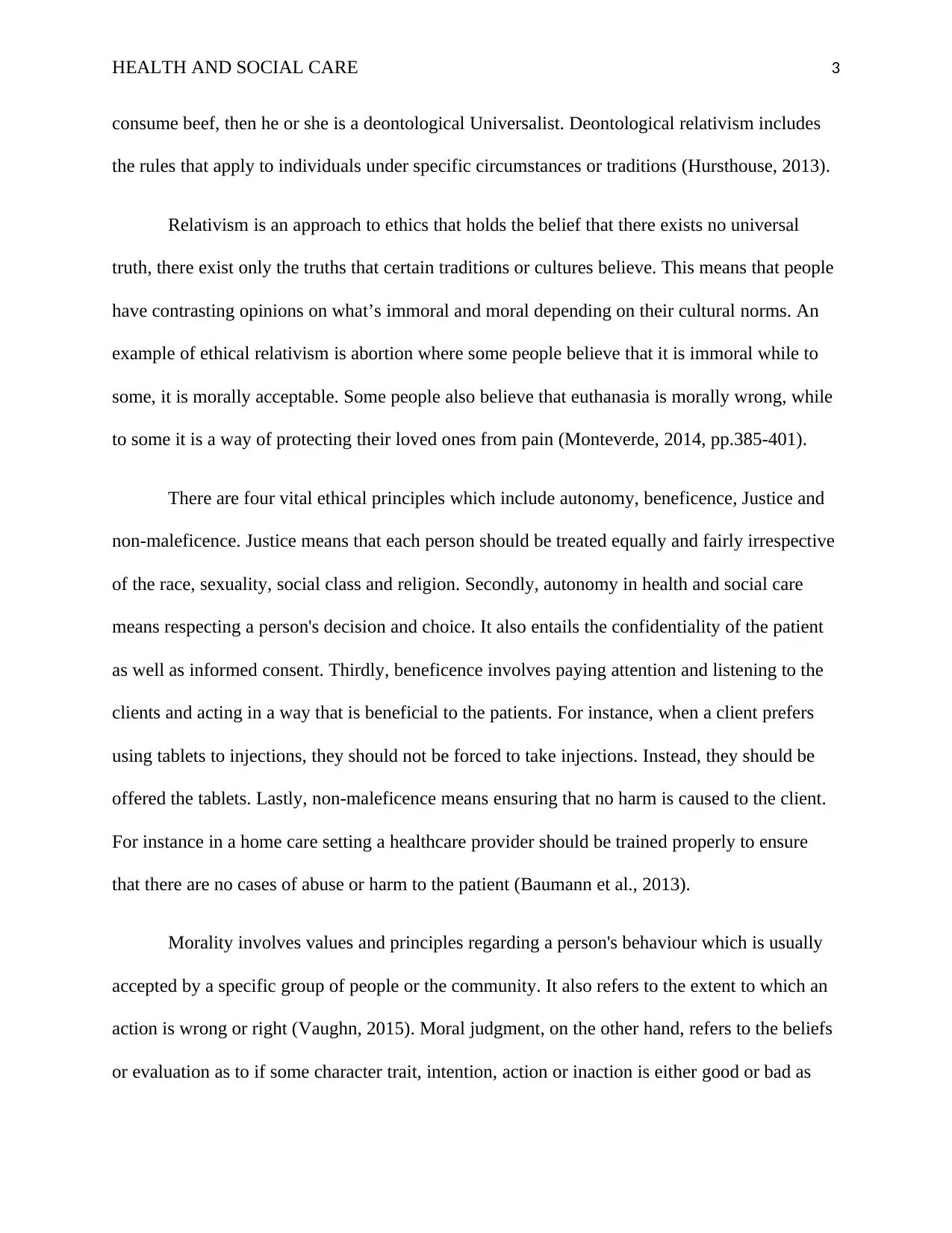
HEALTH AND SOCIAL CARE 3
consume beef, then he or she is a deontological Universalist. Deontological relativism includes
the rules that apply to individuals under specific circumstances or traditions (Hursthouse, 2013).
Relativism is an approach to ethics that holds the belief that there exists no universal
truth, there exist only the truths that certain traditions or cultures believe. This means that people
have contrasting opinions on what’s immoral and moral depending on their cultural norms. An
example of ethical relativism is abortion where some people believe that it is immoral while to
some, it is morally acceptable. Some people also believe that euthanasia is morally wrong, while
to some it is a way of protecting their loved ones from pain (Monteverde, 2014, pp.385-401).
There are four vital ethical principles which include autonomy, beneficence, Justice and
non-maleficence. Justice means that each person should be treated equally and fairly irrespective
of the race, sexuality, social class and religion. Secondly, autonomy in health and social care
means respecting a person's decision and choice. It also entails the confidentiality of the patient
as well as informed consent. Thirdly, beneficence involves paying attention and listening to the
clients and acting in a way that is beneficial to the patients. For instance, when a client prefers
using tablets to injections, they should not be forced to take injections. Instead, they should be
offered the tablets. Lastly, non-maleficence means ensuring that no harm is caused to the client.
For instance in a home care setting a healthcare provider should be trained properly to ensure
that there are no cases of abuse or harm to the patient (Baumann et al., 2013).
Morality involves values and principles regarding a person's behaviour which is usually
accepted by a specific group of people or the community. It also refers to the extent to which an
action is wrong or right (Vaughn, 2015). Moral judgment, on the other hand, refers to the beliefs
or evaluation as to if some character trait, intention, action or inaction is either good or bad as
consume beef, then he or she is a deontological Universalist. Deontological relativism includes
the rules that apply to individuals under specific circumstances or traditions (Hursthouse, 2013).
Relativism is an approach to ethics that holds the belief that there exists no universal
truth, there exist only the truths that certain traditions or cultures believe. This means that people
have contrasting opinions on what’s immoral and moral depending on their cultural norms. An
example of ethical relativism is abortion where some people believe that it is immoral while to
some, it is morally acceptable. Some people also believe that euthanasia is morally wrong, while
to some it is a way of protecting their loved ones from pain (Monteverde, 2014, pp.385-401).
There are four vital ethical principles which include autonomy, beneficence, Justice and
non-maleficence. Justice means that each person should be treated equally and fairly irrespective
of the race, sexuality, social class and religion. Secondly, autonomy in health and social care
means respecting a person's decision and choice. It also entails the confidentiality of the patient
as well as informed consent. Thirdly, beneficence involves paying attention and listening to the
clients and acting in a way that is beneficial to the patients. For instance, when a client prefers
using tablets to injections, they should not be forced to take injections. Instead, they should be
offered the tablets. Lastly, non-maleficence means ensuring that no harm is caused to the client.
For instance in a home care setting a healthcare provider should be trained properly to ensure
that there are no cases of abuse or harm to the patient (Baumann et al., 2013).
Morality involves values and principles regarding a person's behaviour which is usually
accepted by a specific group of people or the community. It also refers to the extent to which an
action is wrong or right (Vaughn, 2015). Moral judgment, on the other hand, refers to the beliefs
or evaluation as to if some character trait, intention, action or inaction is either good or bad as
⊘ This is a preview!⊘
Do you want full access?
Subscribe today to unlock all pages.

Trusted by 1+ million students worldwide
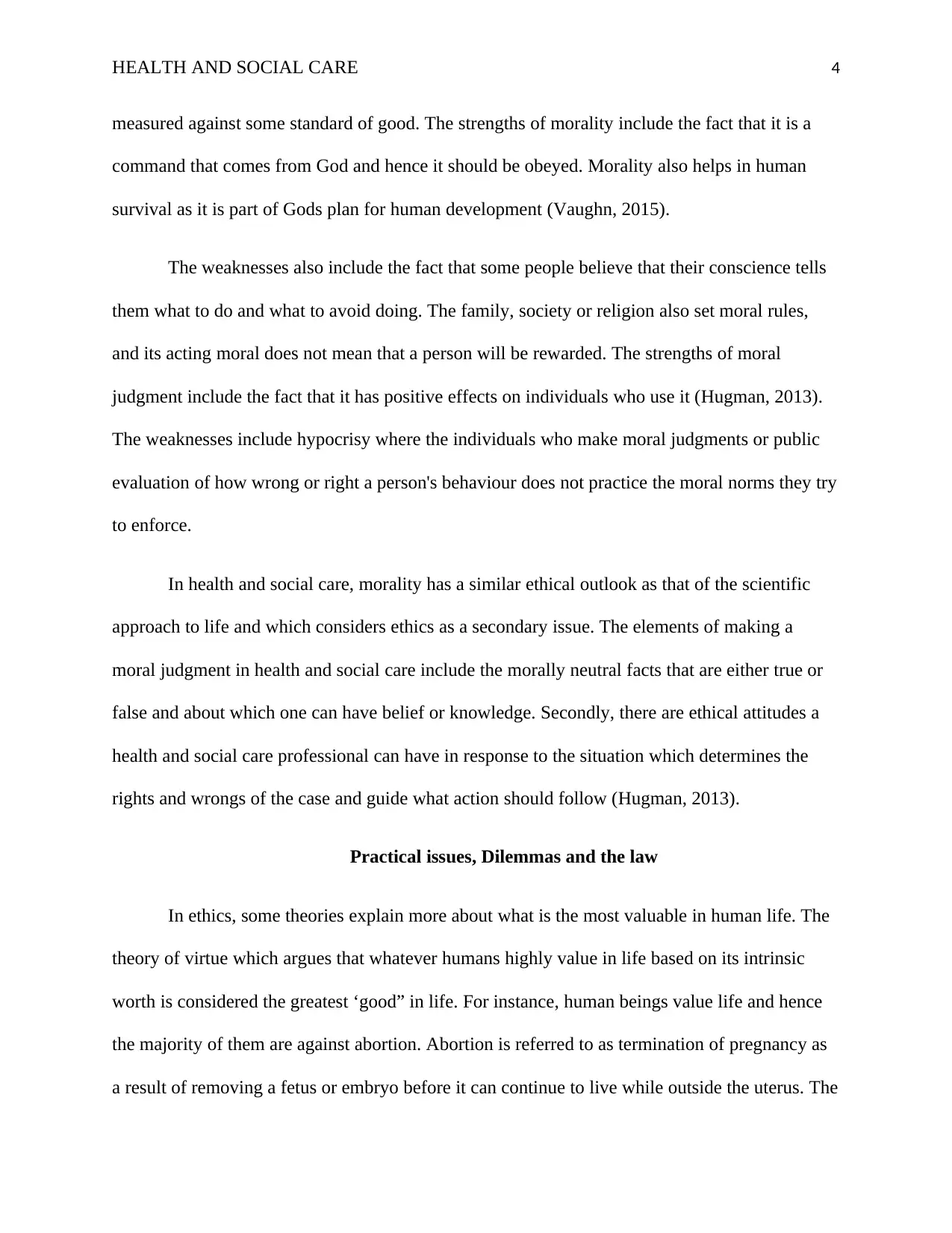
HEALTH AND SOCIAL CARE 4
measured against some standard of good. The strengths of morality include the fact that it is a
command that comes from God and hence it should be obeyed. Morality also helps in human
survival as it is part of Gods plan for human development (Vaughn, 2015).
The weaknesses also include the fact that some people believe that their conscience tells
them what to do and what to avoid doing. The family, society or religion also set moral rules,
and its acting moral does not mean that a person will be rewarded. The strengths of moral
judgment include the fact that it has positive effects on individuals who use it (Hugman, 2013).
The weaknesses include hypocrisy where the individuals who make moral judgments or public
evaluation of how wrong or right a person's behaviour does not practice the moral norms they try
to enforce.
In health and social care, morality has a similar ethical outlook as that of the scientific
approach to life and which considers ethics as a secondary issue. The elements of making a
moral judgment in health and social care include the morally neutral facts that are either true or
false and about which one can have belief or knowledge. Secondly, there are ethical attitudes a
health and social care professional can have in response to the situation which determines the
rights and wrongs of the case and guide what action should follow (Hugman, 2013).
Practical issues, Dilemmas and the law
In ethics, some theories explain more about what is the most valuable in human life. The
theory of virtue which argues that whatever humans highly value in life based on its intrinsic
worth is considered the greatest ‘good” in life. For instance, human beings value life and hence
the majority of them are against abortion. Abortion is referred to as termination of pregnancy as
a result of removing a fetus or embryo before it can continue to live while outside the uterus. The
measured against some standard of good. The strengths of morality include the fact that it is a
command that comes from God and hence it should be obeyed. Morality also helps in human
survival as it is part of Gods plan for human development (Vaughn, 2015).
The weaknesses also include the fact that some people believe that their conscience tells
them what to do and what to avoid doing. The family, society or religion also set moral rules,
and its acting moral does not mean that a person will be rewarded. The strengths of moral
judgment include the fact that it has positive effects on individuals who use it (Hugman, 2013).
The weaknesses include hypocrisy where the individuals who make moral judgments or public
evaluation of how wrong or right a person's behaviour does not practice the moral norms they try
to enforce.
In health and social care, morality has a similar ethical outlook as that of the scientific
approach to life and which considers ethics as a secondary issue. The elements of making a
moral judgment in health and social care include the morally neutral facts that are either true or
false and about which one can have belief or knowledge. Secondly, there are ethical attitudes a
health and social care professional can have in response to the situation which determines the
rights and wrongs of the case and guide what action should follow (Hugman, 2013).
Practical issues, Dilemmas and the law
In ethics, some theories explain more about what is the most valuable in human life. The
theory of virtue which argues that whatever humans highly value in life based on its intrinsic
worth is considered the greatest ‘good” in life. For instance, human beings value life and hence
the majority of them are against abortion. Abortion is referred to as termination of pregnancy as
a result of removing a fetus or embryo before it can continue to live while outside the uterus. The
Paraphrase This Document
Need a fresh take? Get an instant paraphrase of this document with our AI Paraphraser
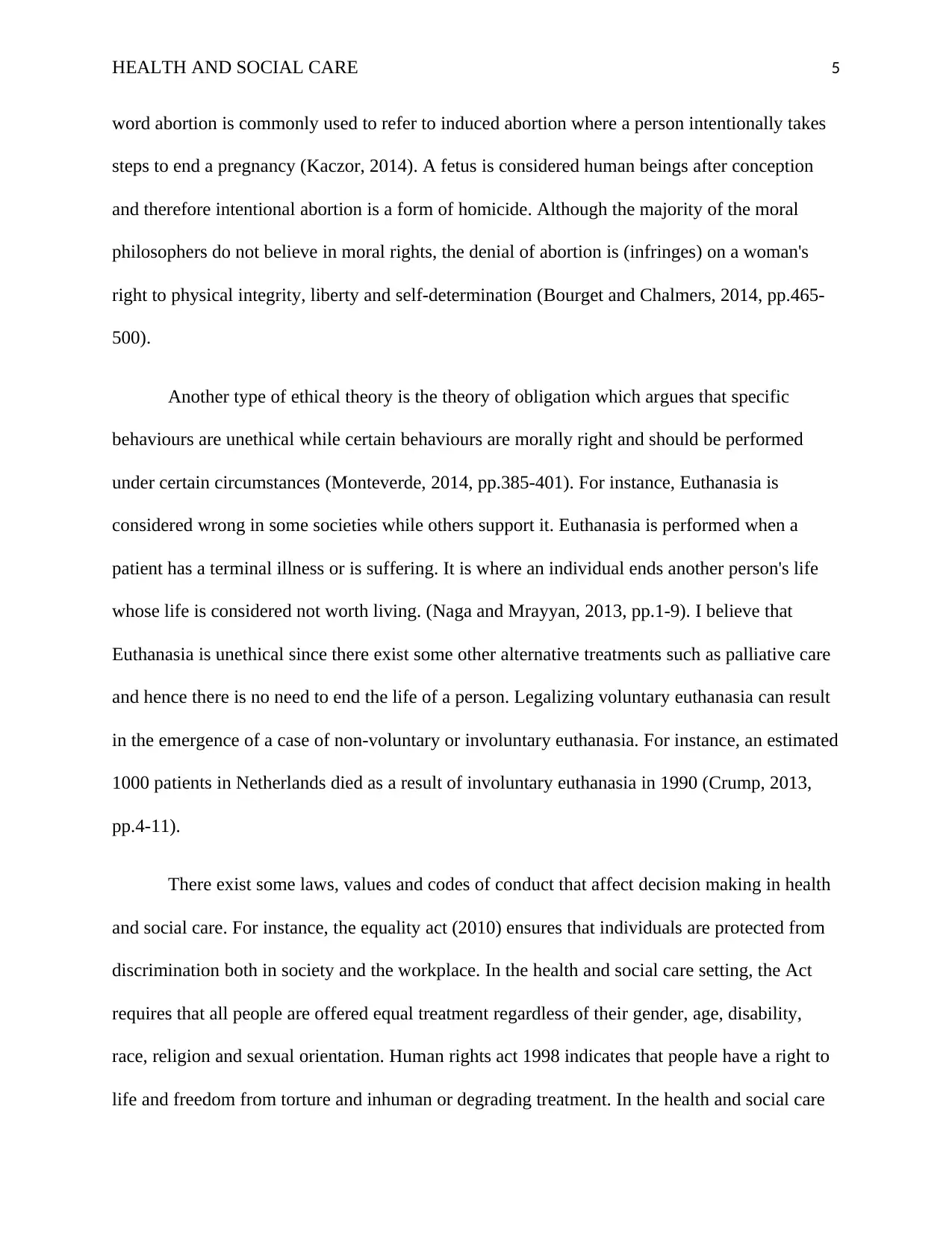
HEALTH AND SOCIAL CARE 5
word abortion is commonly used to refer to induced abortion where a person intentionally takes
steps to end a pregnancy (Kaczor, 2014). A fetus is considered human beings after conception
and therefore intentional abortion is a form of homicide. Although the majority of the moral
philosophers do not believe in moral rights, the denial of abortion is (infringes) on a woman's
right to physical integrity, liberty and self-determination (Bourget and Chalmers, 2014, pp.465-
500).
Another type of ethical theory is the theory of obligation which argues that specific
behaviours are unethical while certain behaviours are morally right and should be performed
under certain circumstances (Monteverde, 2014, pp.385-401). For instance, Euthanasia is
considered wrong in some societies while others support it. Euthanasia is performed when a
patient has a terminal illness or is suffering. It is where an individual ends another person's life
whose life is considered not worth living. (Naga and Mrayyan, 2013, pp.1-9). I believe that
Euthanasia is unethical since there exist some other alternative treatments such as palliative care
and hence there is no need to end the life of a person. Legalizing voluntary euthanasia can result
in the emergence of a case of non-voluntary or involuntary euthanasia. For instance, an estimated
1000 patients in Netherlands died as a result of involuntary euthanasia in 1990 (Crump, 2013,
pp.4-11).
There exist some laws, values and codes of conduct that affect decision making in health
and social care. For instance, the equality act (2010) ensures that individuals are protected from
discrimination both in society and the workplace. In the health and social care setting, the Act
requires that all people are offered equal treatment regardless of their gender, age, disability,
race, religion and sexual orientation. Human rights act 1998 indicates that people have a right to
life and freedom from torture and inhuman or degrading treatment. In the health and social care
word abortion is commonly used to refer to induced abortion where a person intentionally takes
steps to end a pregnancy (Kaczor, 2014). A fetus is considered human beings after conception
and therefore intentional abortion is a form of homicide. Although the majority of the moral
philosophers do not believe in moral rights, the denial of abortion is (infringes) on a woman's
right to physical integrity, liberty and self-determination (Bourget and Chalmers, 2014, pp.465-
500).
Another type of ethical theory is the theory of obligation which argues that specific
behaviours are unethical while certain behaviours are morally right and should be performed
under certain circumstances (Monteverde, 2014, pp.385-401). For instance, Euthanasia is
considered wrong in some societies while others support it. Euthanasia is performed when a
patient has a terminal illness or is suffering. It is where an individual ends another person's life
whose life is considered not worth living. (Naga and Mrayyan, 2013, pp.1-9). I believe that
Euthanasia is unethical since there exist some other alternative treatments such as palliative care
and hence there is no need to end the life of a person. Legalizing voluntary euthanasia can result
in the emergence of a case of non-voluntary or involuntary euthanasia. For instance, an estimated
1000 patients in Netherlands died as a result of involuntary euthanasia in 1990 (Crump, 2013,
pp.4-11).
There exist some laws, values and codes of conduct that affect decision making in health
and social care. For instance, the equality act (2010) ensures that individuals are protected from
discrimination both in society and the workplace. In the health and social care setting, the Act
requires that all people are offered equal treatment regardless of their gender, age, disability,
race, religion and sexual orientation. Human rights act 1998 indicates that people have a right to
life and freedom from torture and inhuman or degrading treatment. In the health and social care
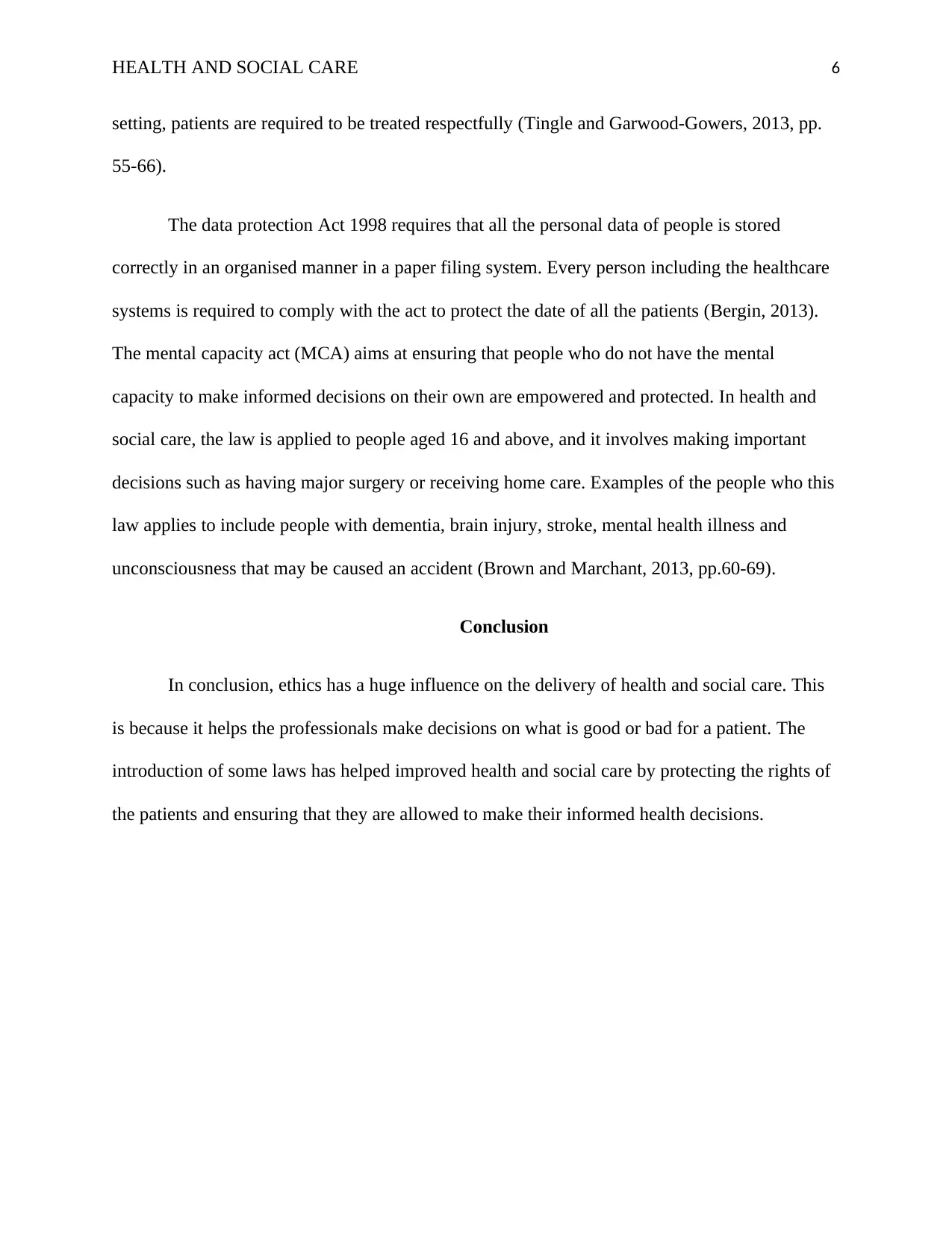
HEALTH AND SOCIAL CARE 6
setting, patients are required to be treated respectfully (Tingle and Garwood-Gowers, 2013, pp.
55-66).
The data protection Act 1998 requires that all the personal data of people is stored
correctly in an organised manner in a paper filing system. Every person including the healthcare
systems is required to comply with the act to protect the date of all the patients (Bergin, 2013).
The mental capacity act (MCA) aims at ensuring that people who do not have the mental
capacity to make informed decisions on their own are empowered and protected. In health and
social care, the law is applied to people aged 16 and above, and it involves making important
decisions such as having major surgery or receiving home care. Examples of the people who this
law applies to include people with dementia, brain injury, stroke, mental health illness and
unconsciousness that may be caused an accident (Brown and Marchant, 2013, pp.60-69).
Conclusion
In conclusion, ethics has a huge influence on the delivery of health and social care. This
is because it helps the professionals make decisions on what is good or bad for a patient. The
introduction of some laws has helped improved health and social care by protecting the rights of
the patients and ensuring that they are allowed to make their informed health decisions.
setting, patients are required to be treated respectfully (Tingle and Garwood-Gowers, 2013, pp.
55-66).
The data protection Act 1998 requires that all the personal data of people is stored
correctly in an organised manner in a paper filing system. Every person including the healthcare
systems is required to comply with the act to protect the date of all the patients (Bergin, 2013).
The mental capacity act (MCA) aims at ensuring that people who do not have the mental
capacity to make informed decisions on their own are empowered and protected. In health and
social care, the law is applied to people aged 16 and above, and it involves making important
decisions such as having major surgery or receiving home care. Examples of the people who this
law applies to include people with dementia, brain injury, stroke, mental health illness and
unconsciousness that may be caused an accident (Brown and Marchant, 2013, pp.60-69).
Conclusion
In conclusion, ethics has a huge influence on the delivery of health and social care. This
is because it helps the professionals make decisions on what is good or bad for a patient. The
introduction of some laws has helped improved health and social care by protecting the rights of
the patients and ensuring that they are allowed to make their informed health decisions.
⊘ This is a preview!⊘
Do you want full access?
Subscribe today to unlock all pages.

Trusted by 1+ million students worldwide
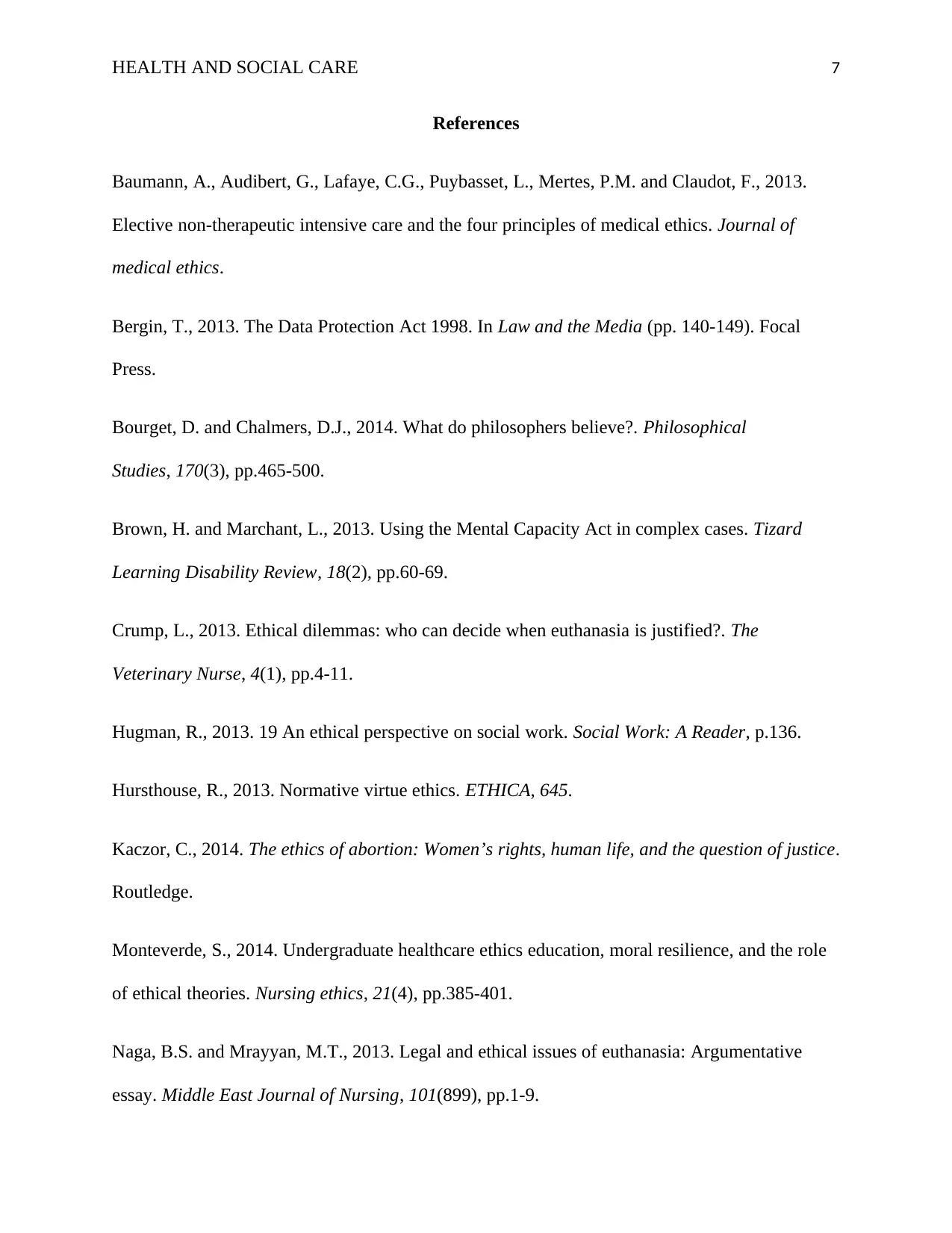
HEALTH AND SOCIAL CARE 7
References
Baumann, A., Audibert, G., Lafaye, C.G., Puybasset, L., Mertes, P.M. and Claudot, F., 2013.
Elective non-therapeutic intensive care and the four principles of medical ethics. Journal of
medical ethics.
Bergin, T., 2013. The Data Protection Act 1998. In Law and the Media (pp. 140-149). Focal
Press.
Bourget, D. and Chalmers, D.J., 2014. What do philosophers believe?. Philosophical
Studies, 170(3), pp.465-500.
Brown, H. and Marchant, L., 2013. Using the Mental Capacity Act in complex cases. Tizard
Learning Disability Review, 18(2), pp.60-69.
Crump, L., 2013. Ethical dilemmas: who can decide when euthanasia is justified?. The
Veterinary Nurse, 4(1), pp.4-11.
Hugman, R., 2013. 19 An ethical perspective on social work. Social Work: A Reader, p.136.
Hursthouse, R., 2013. Normative virtue ethics. ETHICA, 645.
Kaczor, C., 2014. The ethics of abortion: Women’s rights, human life, and the question of justice.
Routledge.
Monteverde, S., 2014. Undergraduate healthcare ethics education, moral resilience, and the role
of ethical theories. Nursing ethics, 21(4), pp.385-401.
Naga, B.S. and Mrayyan, M.T., 2013. Legal and ethical issues of euthanasia: Argumentative
essay. Middle East Journal of Nursing, 101(899), pp.1-9.
References
Baumann, A., Audibert, G., Lafaye, C.G., Puybasset, L., Mertes, P.M. and Claudot, F., 2013.
Elective non-therapeutic intensive care and the four principles of medical ethics. Journal of
medical ethics.
Bergin, T., 2013. The Data Protection Act 1998. In Law and the Media (pp. 140-149). Focal
Press.
Bourget, D. and Chalmers, D.J., 2014. What do philosophers believe?. Philosophical
Studies, 170(3), pp.465-500.
Brown, H. and Marchant, L., 2013. Using the Mental Capacity Act in complex cases. Tizard
Learning Disability Review, 18(2), pp.60-69.
Crump, L., 2013. Ethical dilemmas: who can decide when euthanasia is justified?. The
Veterinary Nurse, 4(1), pp.4-11.
Hugman, R., 2013. 19 An ethical perspective on social work. Social Work: A Reader, p.136.
Hursthouse, R., 2013. Normative virtue ethics. ETHICA, 645.
Kaczor, C., 2014. The ethics of abortion: Women’s rights, human life, and the question of justice.
Routledge.
Monteverde, S., 2014. Undergraduate healthcare ethics education, moral resilience, and the role
of ethical theories. Nursing ethics, 21(4), pp.385-401.
Naga, B.S. and Mrayyan, M.T., 2013. Legal and ethical issues of euthanasia: Argumentative
essay. Middle East Journal of Nursing, 101(899), pp.1-9.
Paraphrase This Document
Need a fresh take? Get an instant paraphrase of this document with our AI Paraphraser
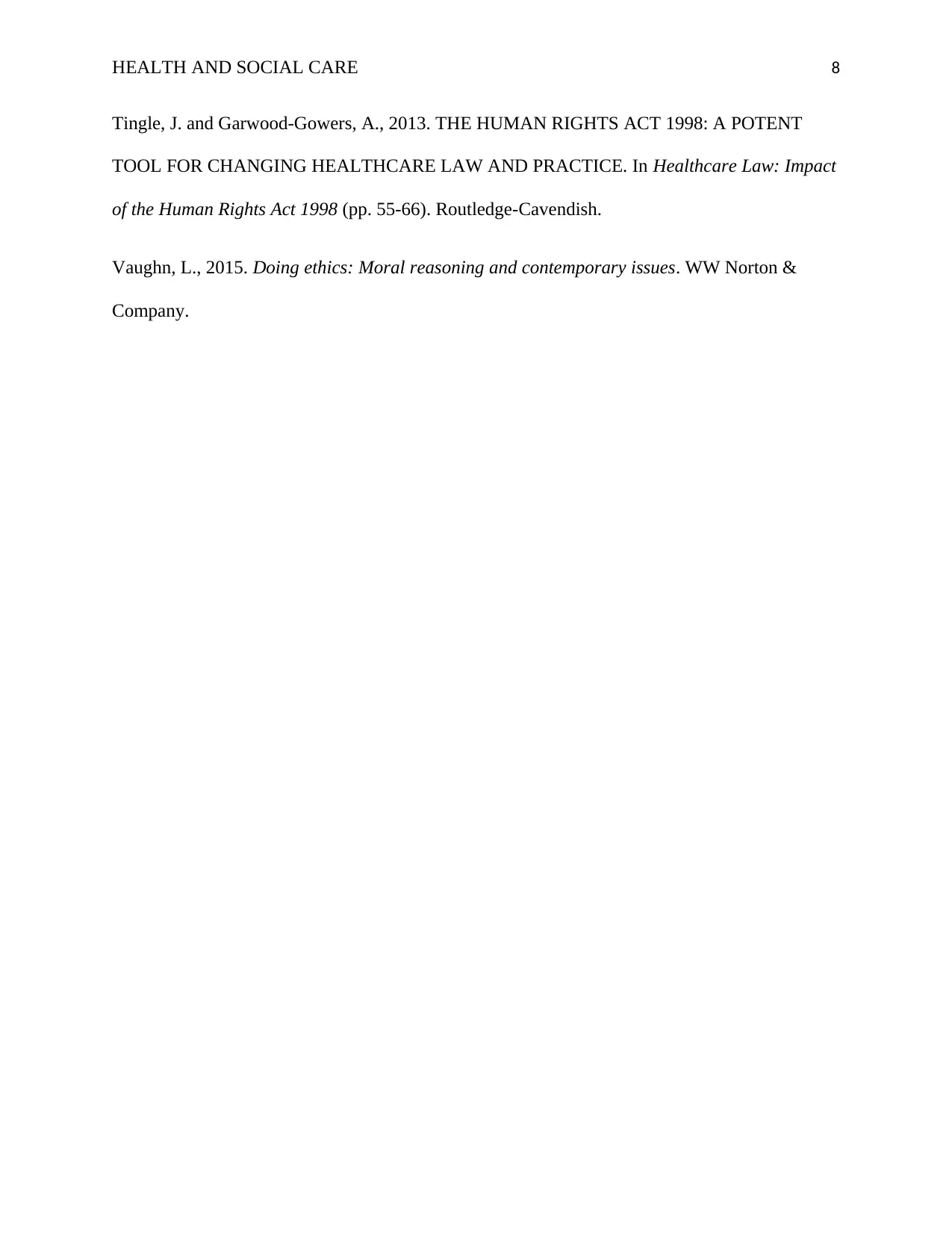
HEALTH AND SOCIAL CARE 8
Tingle, J. and Garwood-Gowers, A., 2013. THE HUMAN RIGHTS ACT 1998: A POTENT
TOOL FOR CHANGING HEALTHCARE LAW AND PRACTICE. In Healthcare Law: Impact
of the Human Rights Act 1998 (pp. 55-66). Routledge-Cavendish.
Vaughn, L., 2015. Doing ethics: Moral reasoning and contemporary issues. WW Norton &
Company.
Tingle, J. and Garwood-Gowers, A., 2013. THE HUMAN RIGHTS ACT 1998: A POTENT
TOOL FOR CHANGING HEALTHCARE LAW AND PRACTICE. In Healthcare Law: Impact
of the Human Rights Act 1998 (pp. 55-66). Routledge-Cavendish.
Vaughn, L., 2015. Doing ethics: Moral reasoning and contemporary issues. WW Norton &
Company.
1 out of 8
Related Documents
Your All-in-One AI-Powered Toolkit for Academic Success.
+13062052269
info@desklib.com
Available 24*7 on WhatsApp / Email
![[object Object]](/_next/static/media/star-bottom.7253800d.svg)
Unlock your academic potential
Copyright © 2020–2026 A2Z Services. All Rights Reserved. Developed and managed by ZUCOL.





